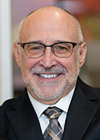Black History Month: Addressing Systemic Inequity to Advance Health
Published February 03, 2022

From the President
Robert A. Cain, DO
President and CEO
American Association of Colleges of Osteopathic Medicine
As osteopathic physicians, educators and learners, we know that people live healthier lives when their physical, mental and spiritual needs are addressed. Harm to one is harm to all. The same concept applies to society. Without equitable policies and access to resources and affordable healthcare, our country will continue to struggle with poor health and emotional distress.
As we celebrate and honor Black History Month this February, we also recognize that today, February 3, is National Women Physician’s Day, which commemorates the birthday of Dr. Elizabeth Blackwell, the first woman to earn a medical degree in the United States. After receiving her acceptance letter, intended as a practical joke, Dr. Blackwell graduated first in her class in 1849.
In 1921, another strong woman, Dr. Meta Christy, defied similar odds to become the first Black osteopathic physician. AACOM will honor Dr. Christy at our Educating Leaders 2022 annual conference this spring with an inaugural “Dr. Meta Christy Presentation.”
Dr. Christy spent nearly four decades serving the Las Vegas, New Mexico community. According to historian Joseph Lordi, “Dr. Christy’s medical practice catered to African Americans who, because of discrimination at that time, were denied service at the local hospital. There were about 100 African Americans and no one to treat them.”
Even though it’s been more than a century since Dr. Christy and Dr. Blackwell earned their medical degrees, we have only just begun to address the pervasive and systemic inequities in our country. In today’s healthcare environment, Black women are three times more likely to die from a pregnancy-related cause than white women. Black patients are 2.54 times more likely to have at least one negative descriptor in their electronic health record than white patients. And throughout the COVID-19 pandemic, Black Americans faced disproportionate rates of infection, hospitalization and mortality compared to white Americans.
In nature, diversity is a marker of health. When we diversify the voices contributing to a solution, that solution is stronger and works better for everyone. In the osteopathic medical education (OME) community, we know that to truly advance Black health and wellness, we need to address the systemic inequities within our healthcare and education institutions. Our member colleges of osteopathic medicine unanimously committed to taking an important first step toward this goal this past October when they formalized a consensus statement to advance diversity, equity and inclusion.
The theme of this year’s Black History Month is “Black Health and Wellness.” As leaders of the OME community, we must do everything we can to advance the mental, physical and spiritual wellbeing not only of Black patients, but also of Black healthcare professionals, medical educators and students if we wish to advance Black health and wellness this month and beyond.
